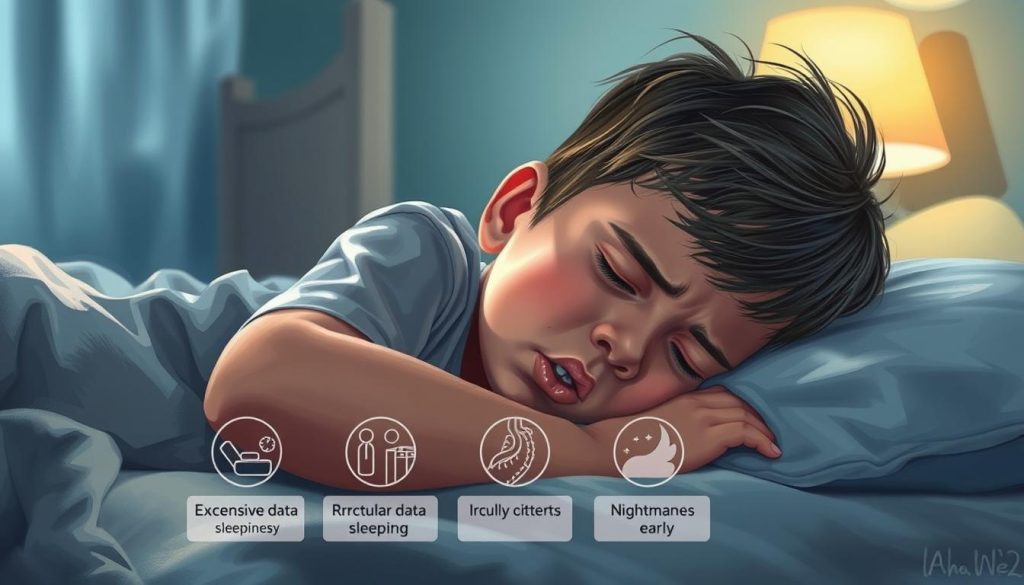Welcome to the world of helping your little ones get quality rest. Modern families face many challenges in setting up healthy bedtime routines. Screen time, busy schedules, and too much information can make it hard to create peaceful nights.
But, there’s good news. Today’s parents have more research on child development than ever. Scientists now know how children’s circadian rhythms work and why they’re so important. These natural body clocks tell kids when they should be awake or asleep.
Understanding parenting and children’s sleep cycles isn’t hard. With the right knowledge and strategies, you can help your family sleep better. This journey starts by recognizing your child’s natural patterns and working with them.
The Importance of Children’s Sleep in Development
Sleep is key for your child’s growth and development. Quality rest helps their bodies and minds build important skills. Knowing about child sleep patterns shows why restful nights are crucial for them.
Research shows sleep impacts kids differently than adults. Their growing brains and bodies need specific sleep cycles. These hours of rest are vital for their daily life, even though you can’t see them.

How Sleep Affects Brain Development
Your child’s brain grows fast, especially in the first years. Deep sleep stages release growth hormones. These hormones help brain cells grow and connect, forming pathways for learning and memory.
Memory gets better during sleep. What your child learns during the day gets stored in long-term memory while they rest. This is why well-rested kids do better in school and remember things easier.
Child sleep patterns also boost cognitive development. REM sleep helps process emotions and experiences. This helps kids understand new information and think critically.
- Neural pathway formation strengthens during deep sleep phases
- Memory consolidation improves learning retention
- Brain detoxification removes harmful waste products
- Synaptic connections develop more efficiently with adequate rest
Sleep’s Role in Emotional Regulation
Well-rested kids handle emotions better than tired ones. Sleep affects mood control and stress management in the brain. Without enough rest, these brain areas struggle.
Emotional outbursts and tantrums often come from poor sleep. Consistent, good sleep helps kids develop emotional resilience. They learn to deal with disappointments and social situations better.
Sleep also helps kids understand social cues and interact with others. Tired kids might misread facial expressions or struggle with jokes. Quality rest improves their social and family relationships.
- Improved mood stability throughout the day
- Better stress response and coping mechanisms
- Enhanced social interaction skills
- Reduced anxiety and behavioral problems
- Greater emotional resilience during challenges
The Impact of Sleep on Physical Health
Physical growth happens mainly during sleep, when growth hormone levels are highest. This hormone helps bones, muscles, and tissues grow. Kids with good sleep patterns grow better.
The immune system also needs sleep. During rest, the body makes cells and antibodies to fight off sickness. Well-rested kids get sick less and recover faster.
Sleep affects metabolism and weight too. Poor sleep can lead to overeating or bad food choices. Kids with regular sleep schedules tend to be healthier and have more energy.
- Growth hormone release peaks during deep sleep stages
- Immune system strengthening occurs overnight
- Cellular repair and tissue regeneration happen during rest
- Metabolism regulation improves with quality sleep
- Physical coordination and motor skills develop better
Understanding sleep’s role in development helps parents focus on their kids’ rest. Every effort to improve sleep quality boosts their health, happiness, and success.
Common Sleep Patterns in Children
Newborns sleep a lot, while older kids need less. Each age has its own sleep needs. Knowing these patterns helps you support your child’s sleep.
As kids grow, so do their sleep needs. What works for a baby won’t work for a toddler. Parents need to adjust their strategies to meet these changes.

Newborns: Understanding Sleep 16-18 Hours a Day
Newborns sleep a lot, but in short bursts. They spend more time in active sleep than adults. This is why they wake up often and seem restless.
Improving infant sleep means understanding their natural rhythms. Newborns don’t know day from night at first. Their sleep patterns improve as they get older.
Key newborn sleep traits include:
- Frequent feeding interruptions every 2-3 hours
- Shorter sleep cycles lasting 50-60 minutes
- More light sleep phases than deep sleep
- Gradual development of day-night awareness
Supporting newborn sleep means creating a consistent environment. Swaddling and white noise can help them settle. Remember, waking up often is normal for their growth.
Toddlers: Asleep in 12-14 Hours, Wakeful Moments
Toddlers sleep 12-14 hours a day, including naps. They become more aware of their surroundings. Managing toddler sleep requires patience and consistency.
Toddlers may resist sleep due to separation anxiety and fear of missing out. They might fight bedtime or ask for more stories. These behaviors are normal and need gentle but firm responses.
Common toddler sleep challenges include:
- Bedtime resistance and stalling tactics
- Night wakings due to developmental leaps
- Transitioning from two naps to one
- Moving from crib to toddler bed
- Nightmares and night terrors
Managing toddler sleep means being consistent but flexible. Toddlers like predictability. Giving them choices, like picking pajamas, helps them feel in control.
School-Aged Children: Balancing Sleep with Activities
School-aged kids need 9-11 hours of sleep each night. But, their busy schedules make it hard. Finding the right balance is key for healthy sleep.
This age group faces unique challenges. Homework, screen time, and peer pressure can affect sleep. They might resist early bedtimes, wanting to stay up like their siblings.
Strategies for school-aged sleep success include:
- Establishing consistent weekday and weekend schedules
- Creating homework completion deadlines before bedtime
- Limiting screen exposure in the hour before sleep
- Encouraging physical activity during the day
- Teaching children about sleep’s importance for learning
Parents can help school-aged kids prioritize sleep by setting family sleep rules. When they understand why sleep is important, they’re more likely to follow bedtime routines. Regularly checking in about sleep helps identify when changes are needed.
Seasonal changes and activity levels also impact school-aged sleep. Summer might allow later bedtimes, while school year demands require earlier rest. Being flexible within consistent frameworks helps kids adapt while maintaining healthy sleep habits.
Recognizing Sleep Disorders in Kids
Knowing when your child’s sleep issues are more than normal can help you act fast. Many kids have occasional sleep problems, but some signs point to serious health issues. It’s important to know the difference between normal sleep issues and serious ones.
Spotting sleep problems early can stop long-term health and development issues. Many parents think sleep issues are just phases. But, some signs need medical help.

Signs of Sleep Disorders to Watch For
Some signs show your child might have more than just normal sleep troubles. Trouble falling asleep, even with the same bedtime routine, is a big clue. If it takes more than 30 minutes to fall asleep, it’s time to see a doctor.
Physical signs during sleep are also important. Look out for loud snoring, gasping, or restlessness. Night terrors, frequent nightmares, and bedwetting in older kids are also warning signs.
- Loud snoring or breathing difficulties during sleep
- Frequent gasping or choking sounds at night
- Restless sleep with excessive tossing and turning
- Night terrors or frequent nightmares
- Bedwetting in children over age 6
Daytime behaviors can also show sleep problems. Kids with sleep disorders might be very tired, have trouble focusing, or change moods. Sometimes, they might seem too hyper.
How Sleep Disorders Affect Daily Life
Untreated sleep issues can affect many areas of your child’s life. Poor sleep can hurt school grades and cause trouble following instructions. Teachers might notice these problems.
Sleep disorders can also strain social relationships. Kids might get angry, aggressive, or pull away from friends and family. This can hurt their self-esteem and how they interact with others.
Physical health can also suffer. Lack of sleep weakens the immune system and can slow growth. This is because the body doesn’t produce enough growth hormone when it’s tired.
When to Seek Professional Help
Some sleep problems need quick medical help. If your child’s sleep issues last more than two weeks, even with the same bedtime routine, see a doctor. Call for emergency help if they have trouble breathing at night or are extremely tired during the day.
Be ready for doctor visits by keeping a sleep diary. Note bedtimes, wake times, and any unusual sleep behaviors. This helps doctors understand your child’s sleep patterns and find any disorders.
Your doctor might send you to a sleep specialist for more tests. These tests can find specific sleep disorders and help plan treatment. Early treatment can help your child a lot.
Tips for Establishing a Healthy Sleep Routine
Every parent knows that setting up healthy bedtime rituals can make evenings calm. Creating sleep routines for kids takes time, but it’s worth it. The key is to make the environment calm, keep a regular schedule, and use activities that signal it’s time to sleep.
Every child is different, so what works for one might not work for another. The most important thing is to be consistent and patient. This will help you and your child develop new habits together.
Creating a Calm and Cozy Sleep Environment
Your child’s bedroom should be a peaceful place that encourages sleep. Start by dimming the lights an hour before bedtime. This helps their body make melatonin naturally.
The room’s temperature is also important for sleep. Keep it between 65-70 degrees Fahrenheit. A room that’s too warm or too cold can disrupt sleep.
- Use blackout curtains or shades to block outside light
- Add a white noise machine to mask household sounds
- Choose comfortable, breathable bedding materials
- Remove electronic devices from the sleeping area
- Include a favorite stuffed animal or comfort item
Setting a Consistent Bedtime Schedule
Consistency is key for successful sleep routines. Choose a bedtime that lets your child get enough sleep. Try to keep the same schedule even on weekends.
Start your bedtime rituals at the same time every night. This could include a bath, brushing teeth, or reading a story. These activities should take about 30-45 minutes and follow the same order every night.
If holidays or special events mess up your routine, get back to it as soon as you can. Your child’s body will adjust faster if you stick to the routine most of the time.
Incorporating Relaxation Techniques
Teaching your child relaxation methods can help them sleep better and manage anxiety. These skills are valuable for life.
Deep breathing exercises are great for kids as young as four. Teach them to breathe in slowly, hold, then exhale. Practice this together during calm moments, not just at bedtime.
Progressive muscle relaxation helps kids release tension. Guide them to tense and then relax different muscle groups. Make it fun by calling it “robot and rag doll” time.
Consider these age-appropriate relaxation activities:
- Gentle stretching or yoga poses designed for children
- Guided imagery stories that transport them to peaceful places
- Soft background music or nature sounds
- Gratitude sharing about the day’s positive moments
- Simple meditation apps designed for kids
Building effective sleep routines for kids takes time and patience. Celebrate small victories and don’t get discouraged if some nights are tough. With consistent effort, these bedtime rituals will become second nature for your family, leading to better sleep for everyone.
Nutritional Impact on Children’s Sleep
The link between what kids eat and how well they sleep is clear. What your child eats can affect their sleep. Knowing what foods help with sleep can guide parents in making better choices.
When and what kids eat before bed is key. Eating too much before bed can keep them awake. But, the right foods can help them relax and sleep better. This doesn’t mean you have to change your family’s diet a lot.
Foods that Promote Better Sleep
Some foods help kids relax at night. Foods like turkey, milk, and bananas have tryptophan. This helps make hormones that help kids sleep.
Magnesium in foods like whole grains and nuts also helps with sleep. Foods like oatmeal and sweet potatoes keep blood sugar steady at night.

Warm milk before bed is not just a myth. It has tryptophan and calcium that help kids sleep. Greek yogurt with honey is also good for sleep and energy.
Foods to Avoid Before Bedtime
Some foods can make it hard for kids to sleep. Caffeine is in coffee, chocolate, and some sodas. Avoid these for at least four hours before bed.
Sugary snacks and drinks can make kids restless. Foods high in fat or spice take a lot of energy to digest. Drinking too much before bed can lead to midnight trips to the bathroom.
Processed foods with artificial colors and preservatives can also affect sleep. Reading labels and choosing whole foods is better for health and sleep.
The Connection Between Snacks and Sleep Quality
Choosing the right snacks before bed can help kids sleep better. A small snack about an hour before bed can stop hunger from waking them. It’s important to pick light, easy-to-digest foods.
A snack with a little protein and complex carbs is best. Apple slices with almond butter or whole grain crackers with cheese are good options. Keep snacks small, about 150 calories or less, to support sleep without upsetting the stomach.
Supporting Your Child’s Sleep Through Parenting
Your parenting style is key to your child’s sleep success. How you guide and support them affects their sleep habits. These habits are important for their health and well-being.
The Role of Parenting Styles in Sleep Habits
Parenting styles shape sleep environments differently. Authoritative parents, who are both warm and set clear rules, often see better sleep. They create a consistent bedtime routine while still being responsive to their child’s needs.
Sleep training works best when parents find a balance. They need to be structured yet flexible.
Encouraging Independence During Sleep
Teaching your child to self-soothe takes time and patience. Start by slowly reducing your presence at bedtime. Let older children make choices, like picking pajamas or a bedtime story.
This independence helps them feel in control of their sleep.
Communicating the Importance of Rest
Explain why sleep is important in a way your child can understand. Tell younger kids that sleep helps their bodies grow. Explain to older kids how rest improves their mood, memory, and school performance.
When kids see the benefits of sleep, they’re more likely to stick to good sleep habits.
Supporting your child’s sleep is a journey that changes as they grow. Stay patient, flexible, and consistent in your approach.

